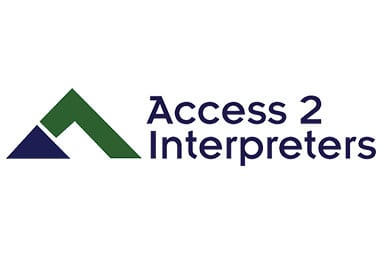Tips For Working With Interpreters
At Access 2 Interpreters, our trained professionals promise to deliver interpretations accurately and reliably. Using an interpreter does add another step in the communication process, yet by following the tips listed below, you can be set up for a successful interaction with our interpreters.
Spoken languages are unique, and in their individual intricacies are one of the most beautiful things people have ever created – but at the same time, this individuality and uniqueness can make it hard to translate and interpret languages. For this reason, we have highlighted some of the most important tips to use when dealing with a translator or interpreter to make for a more efficient and effective experience.
Regardless of the type of interaction, we offer interpretation and translation services to fit your needs.
Allow the interpreter to introduce him/herself and brief them on the situation.
The interpreter will quickly explain to the person that they are a professional interpreter and will be interpreting everything they say. Not only will this clarify the interpretation process, especially in phone interpretation, but it is also very reassuring to the individual.
Once they have introduced themselves, fill them in on the key points of your specific scenario. By giving them a rundown of what to expect, your translator will have a better grasp of the situation at hand and will be able to do their job more effectively and accurately.
Speak directly to the individual and make eye contact. Speak in the first person.
Using an interpreter doesn’t mean that it has to be less personal. A great tip here is to speak to the individual as if there were no interpreters around. Speak in the first person, not the third. It is easier and way more effective for an interpreter to interpret first-person interactions.
Use short but complete sentences.
This one is difficult to get used to at first, but using short sentences will give the interpreter a chance to relay what you are saying effectively. Interpreters may take notes to remember key things you say during a more “long-winded” sentence, but short and complete sentences ensure that no detail is left out.
Avoid slang, jargon, or metaphors.
Phrases like “it’s raining cats and dogs” or “on the same page” may not translate very well into other languages. You could end up confusing a patient and affecting their understanding of treatment. Avoid these scenarios by choosing straightforward words and analogies.
Contact us Today for All of Your Columbus Translation and Interpretation Needs.
At Access 2 Interpreters we want to make your next translation a smooth transition. As a leader in Columbus translation and interpretation, A2I wanted to give you these tips so that you can feel confident during your next face-to-face or phone interpretation. If you have questions or would like to schedule an interpretation please contact us today.
If you would like to learn more about the services we offer and how we prepare translators for every possible situation head on over to our Access Academy. This is where you will find all of the training seminars that we use to prepare our translators to be the best in Columbus. We cover every situation including, but not limited to, ethics, medical terminology, legal terminology, and general translator training.





 The Importance of Voice Inflection in Interpreting
The Importance of Voice Inflection in Interpreting


